|
|
|
|
|
|
|
|
In the Spirit of the Rovaniemi Process 2015, November 24-26, 2015 (Rovaniemi, Lapland, Finland). When the Arctic Environmental Protection Strategy, the so-called Rovaniemi Process, was adopted in 1991, it aimed at overcoming divisions and turning the zone of Cold War military tensions into a region of peace and co-operation. In this joint effort focusing on the protection of environment, and later, sustainable development, the Arctic states supported by indigenous organizations laid grounds for institutionalized collaboration and the emergence of Arctic regional identity. The second international conference will bring together decision-makers, scholars, artists, designers and students to address these questions and discuss the Arctic in global, regional and local perspectives.
Today's Congressional Action:
The House and Senate are not in session.
|
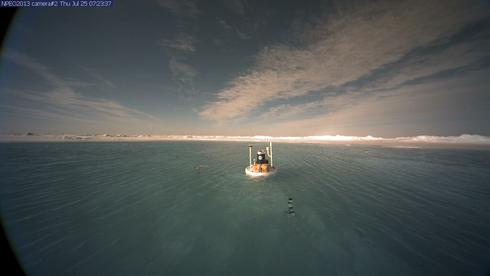 Cleaner Atmosphere Means More Arctic Sea-Ice Melt, Study Says. To protect human health and safeguard the environment, governments and utility companies around the world have worked -- successfully -- to reduce the amount of sulfur dioxide released into the atmosphere. But there's a downside to cleaning the air of sulfur dioxide and similar pollutants: Arctic sea ice is more exposed to solar heat, and more of it melts. Now, Environment Canada researchers, in a study published in Geophysical Research Letters, have put a number on the sea-ice melt that reduced emissions of sulfur dioxide (and certain other aerosols, tiny particles that are suspended in the atmosphere) are expected to cause: about 400,000 square miles or 1 million square kilometers. Alaska Dispatch News Cleaner Atmosphere Means More Arctic Sea-Ice Melt, Study Says. To protect human health and safeguard the environment, governments and utility companies around the world have worked -- successfully -- to reduce the amount of sulfur dioxide released into the atmosphere. But there's a downside to cleaning the air of sulfur dioxide and similar pollutants: Arctic sea ice is more exposed to solar heat, and more of it melts. Now, Environment Canada researchers, in a study published in Geophysical Research Letters, have put a number on the sea-ice melt that reduced emissions of sulfur dioxide (and certain other aerosols, tiny particles that are suspended in the atmosphere) are expected to cause: about 400,000 square miles or 1 million square kilometers. Alaska Dispatch News
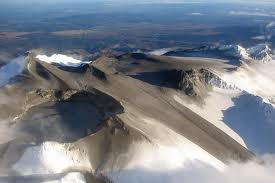 Reducing Black Carbon and Methane Emissions Could Reduce Arctic Warming. Reducing emissions of short-lived climate pollutants, such as methane and black carbon, alongside carbon dioxide could help reduce the warming of the Arctic by up to 0.25 degrees by 2050, says a new report by the Arctic Council. The report released by the Arctic Monitoring and Assessment Program (AMAP) looks at how short-lived climate pollutants (SLCP), play a part in global warming. CBC News Reducing Black Carbon and Methane Emissions Could Reduce Arctic Warming. Reducing emissions of short-lived climate pollutants, such as methane and black carbon, alongside carbon dioxide could help reduce the warming of the Arctic by up to 0.25 degrees by 2050, says a new report by the Arctic Council. The report released by the Arctic Monitoring and Assessment Program (AMAP) looks at how short-lived climate pollutants (SLCP), play a part in global warming. CBC News
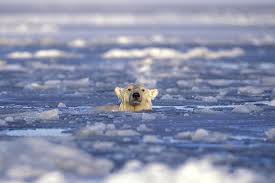 Study: Less Chukchi Sea Ice Means More Polar Bears on Land-and Possibly More Bear-Human Encounters. In recent years, polar bears have become the lovable poster children for climate change in the Arctic. And as their preferred sea ice habitat continues to diminish year after year, thanks to warming temperatures in the region, it seems there's no end to the polar bear's troubles. Now, a new study in PLOS One has brought to light one more problem for one more polar bear population. Bears in the Chukchi Sea region -- that's the body of water between Russia and Alaska -- are spending more time on land in the summers as the amount of summer sea ice in the Chukchi Sea continues to shrink. And that could lead to myriad problems -- not only for the bears but also for the humans they may run into. Alaska Dispatch News Study: Less Chukchi Sea Ice Means More Polar Bears on Land-and Possibly More Bear-Human Encounters. In recent years, polar bears have become the lovable poster children for climate change in the Arctic. And as their preferred sea ice habitat continues to diminish year after year, thanks to warming temperatures in the region, it seems there's no end to the polar bear's troubles. Now, a new study in PLOS One has brought to light one more problem for one more polar bear population. Bears in the Chukchi Sea region -- that's the body of water between Russia and Alaska -- are spending more time on land in the summers as the amount of summer sea ice in the Chukchi Sea continues to shrink. And that could lead to myriad problems -- not only for the bears but also for the humans they may run into. Alaska Dispatch News
ArcticNet Director Louis Fortier Gets Northern Science Award. Louis Fortier, the scientific director of the ArcticNet research network, is the 2015 winner of the Northern Science Award, Polar Knowledge Canada announced Nov. 19. "He has inspired and fostered the creation of knowledge that directly benefits northern societies and communities," the federal agency said in an announcement. Nunatsiaq Online
|
Legislative Action
No Arctic legislation was formally considered yesterday.
|
|
Future Events
Arctic Council and Beyond, December 4, 2015 (Ottawa, Ontario, Canada). This one-day conference hosted by The Northern Institute will focus on the role of the Arctic Council as a forum for Arctic cooperation, the place of the Arctic in Canada's foreign policy and approach to the circumpolar world, the role of the Arctic in global relations in light of the increasing interest in the region by European and Asian states, and the voice of Indigenous Peoples within the Arctic Council and in shaping circumpolar countries' Arctic policies.
Paris Arctic Climate Research Strategy Meeting, December 4, 2015 (Paris, France). The purpose of this facilitated discussion is to discuss future regional, national, and international funding opportunities for interdisciplinary Arctic climate research and develop concrete ideas for such research. All disciplines across humanities, social and natural sciences, art, health, technology and others as well as representatives of research, government, civil society, business and others are encouraged to attend.
Arctic Encounter Paris (AEP 2015), December 11-12, 2015 (Paris, France) (During the UN Convention on Climate Change - COP21). The Arctic Encounter Paris (AEP) will take place at the French Senate at Luxembourg Palace and the 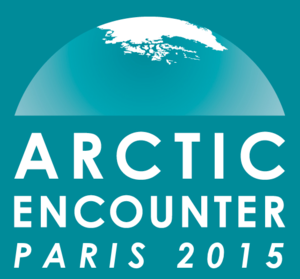 French Military College, École Militaire, in Paris, France, on the final days of the monumental United Nations Convention on Climate Change (COP21) where thousands of global citizens and government delegates will be gathered to deliberate the world's response to our changing planet in Paris. The AEP is the only Arctic policy and economics side event currently planned to take place during the UN Convention. A reception will take place following the closing panel. French Military College, École Militaire, in Paris, France, on the final days of the monumental United Nations Convention on Climate Change (COP21) where thousands of global citizens and government delegates will be gathered to deliberate the world's response to our changing planet in Paris. The AEP is the only Arctic policy and economics side event currently planned to take place during the UN Convention. A reception will take place following the closing panel.
 Fall meeting of the American Geophysical Union, December 14-18, 2015 (San Francisco, California). The 48th meeting of the union brings together nearly 24,000attendees, and lots of Arctic research results. The scientific program is here. There will be several Arctic-related "Town Hall" meetings, including those sponsored by NASA, DOE, NSF, ISAC, IARPC, and SEARCH. Fall meeting of the American Geophysical Union, December 14-18, 2015 (San Francisco, California). The 48th meeting of the union brings together nearly 24,000attendees, and lots of Arctic research results. The scientific program is here. There will be several Arctic-related "Town Hall" meetings, including those sponsored by NASA, DOE, NSF, ISAC, IARPC, and SEARCH.
This symposium is part of an ongoing initiative of the National Academies of Science Polar Research Board to expand public understanding of why the dramatic changes affecting the Arctic region ultimately matter to us all. The agenda features engaging presentations and discussions with top Arctic science and policy experts, and displays and interactive exhibits that illustrate Arctic change and its global impacts. The event is free and open to the public. There are sponsorship opportunities, and a call for exhibitor applications (by Oct.31, 2015). Audience space is limited, so register today; and please encourage your friends, neighbors, and colleagues to participate-as our goal is to reach well beyond the small circle of specialists who typically attend Arctic-themed events in the DC area. The U.S. Arctic Research Commission is helping to sponsor this event.
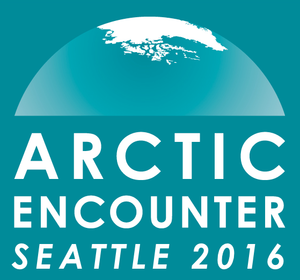 Building upon the preceding Arctic Encounter event in Paris, the third annual Arctic Encounter Symposium (AES) in Seattle, Washington will convene policymakers, industry leaders, and leading experts to confront the leading issues in Arctic policy, innovation, and development. As the largest annual Arctic policy event in the United States, the AES mission is to raise awareness, engage challenges, and develop solutions for the future of a region and a people. The two-day program includes two keynote luncheons, expert plenary sessions, break out sessions, a networking cocktail reception and seated dinner. A closing reception will take place at the conclusion of the program. Building upon the preceding Arctic Encounter event in Paris, the third annual Arctic Encounter Symposium (AES) in Seattle, Washington will convene policymakers, industry leaders, and leading experts to confront the leading issues in Arctic policy, innovation, and development. As the largest annual Arctic policy event in the United States, the AES mission is to raise awareness, engage challenges, and develop solutions for the future of a region and a people. The two-day program includes two keynote luncheons, expert plenary sessions, break out sessions, a networking cocktail reception and seated dinner. A closing reception will take place at the conclusion of the program.
**New this week** 2016 Arctic Frontiers, January 24-29, 2015 (Tromso¸, Norway).The Arctic is a global crossroad between commercial and environmental interests. The region holds substantial natural resources and many actors are investigating ways to utilise these for economic gain. Others view the Arctic as a particularly pristine and vulnerable environment and highlight the need to limit industrial development. Arctic Frontiers 2016 will discuss the balance between resource utilisation and preservation, and between industrial and environmental interests in the Arctic. Envisioning a well-planned, well-governed, and sustainable development in the Arctic, how can improved Arctic stewardship help balance environmental concerns with industrial expansion? How can the industrial footprints from future business activities be minimised? And last, but not least, what role will existing and emerging technologies play in making industrial development profitable and environmentally friendly, securing a sustainable growth scenario for Arctic communities?
16th Alaska Marine Science Symposium, January 25-29, 2016 (Anchorage, AK, USA). No detailed info yet (common guys...), but a valuable meeting, focusing on research results from the Gulf of Alaska, the Bering Sea, and the Arctic Ocean. Good, in-depth, research from Alaska's marine regions. AMSS.
ICETECH 2016, August 15-18, 2016 (Anchorage, Alaska, USA). The Arctic Section of the Society of Naval Architects and Marine Engineers (SNAME) together with Alaska's Institute of the North (ION) will host the International Conference and Exhibition on Performance of Ships and Structures in Ice (ICETECH 16), the premiere international conference on ships and structures in ice. The conference will take place in Anchorage starting with an opening icebreaker reception on the evening of Monday, August 15, and concluding in the afternoon on Thursday August 18, with a possible workshop on Arctic EER on Friday August 19.
Inuit traditions are a repository of Inuit culture and a primary expression of Inuit identity. The theme for the 2016 Inuit Studies Conference invites Elders, knowledge-bearers, researchers, artists, policy-makers, students and others to engage in conversations about the many ways in which traditions shape understanding, while registering social and cultural change. The institutional hosts of "Inuit Traditions," Memorial University of Newfoundland and the Nunatsiavut Government, invite you to contribute to an exchange of knowledge to be held in St. John's, Newfoundland and Labrador, October 7-10, 2016. Presentations on all aspects of Inuit studies will be welcome.
|
|

  
4350 N. Fairfax Drive, Suite 510
Arlington, VA 22203, USA
External links in this publication, and on the USARC's World Wide Web site ( www.arctic.gov) do not constitute endorsement by the US Arctic Research Commission of external Web sites or the information, products or services contained therein. For other than authorized activities, the USARC does not exercise any editorial control over the information you may find at these locations. These links are provided consistent with the stated purpose of this newsletter and the USARC Web site.
|
|
|
|
|
|
|
|
|